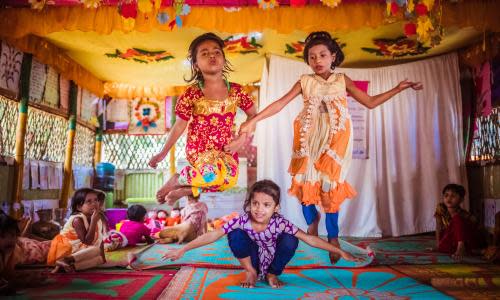Local rhymes and puppet shows: how refugee children are learning through play

Imagine walking through the largest refugee camp in recorded history. Hastily erected structures of bamboo and tarpaulin spread out as far as the eye can see, rendered predominantly in shades of browns and greys. Then imagine hearing the sound of children singing and chanting. You walk towards the place the sound is coming from and duck your head under the tarpaulin to enter a room that’s an explosion of colour. Embroidered mats line the floor, children’s paintings flap from strings around the walls, red plastic crates heave with crayons and play equipment, and young children are smiling and chanting, jumping and playing.
You might have encountered this scene had you visited the Rohingya refugee camp in Cox’s Bazar, Bangladesh, in February 2020. You would have walked into a BRAC Humanitarian Play Lab (HPL), an oasis for the children who have lived in this camp since they fled their homes in Myanmar in 2017. These child-friendly spaces were a place for them to learn and play and feel connected with their culture. But in March last year those colourful structures fell silent when the country went into lockdown.
“Pre-Covid we had amazing provision for children in the camp,” says Erum Mariam, executive director of the BRAC Institute of Educational Development in Bangladesh.
“We had created a curriculum for the children based on research we began almost as soon as the refugees started coming in 2017,” says Mariam. “We asked the children what they used to play in Myanmar. They had a lot of balance and coordination games, local rhymes called kabbya and a love of flower motifs. All of these found their way into the play lab provision.” However, when lockdown struck in March 2020 all access to this rich early years education came to a halt.
“Children in refugee settings are facing a double emergency, which makes it particularly difficult. They are in double jeopardy,” says Joan Lombardi, a senior scholar at the Georgetown University Center for Child and Human Development, in Washington DC.
The wellbeing of parents and caregivers affects the wellbeing of children and so the stress that comes with both Covid-19 and being in an emergency puts a real strain on families. “It is difficult to be a responsive caregiver when you are worried about your family’s security; caregivers need support,” says Lombardi. “The HPLs were a respite for parents and a place where children could express themselves.”
Mariam and her team were determined to do something to help parents and caregivers have meaningful playful interactions with children despite the closure of the HPLs. “Play helps children better manage trauma, especially when they have experienced crisis, violence and poverty,” says Mariam. “So it was vital that we found a way to continue to reach these vulnerable families.”
They adapted by initiating weekly mobile phone consultations with families. The BRAC Institute trained 1,250 play leaders to make the calls, which have a component for psychosocial support and another component on play-based learning. They have called the model Pashe Achhi, which means “beside you”.
“We would check in with the caregiver, ask them how they were doing, give them space to voice their worries and concerns and then we would sing kabbya with them and their children,” says Mariam. “We would also encourage some physical play.”
These regular calls have also enabled the BRAC to continue to identify the needs of the community and refer families to counselling services when necessary.
“Playful experiences are arguably most important during stressful times or times when children may be exposed to adversity such as violence, poverty, displacement, leading to emotional distress,” says Nada Elattar, early childhood development specialist at Unicef.
“When children take part in play that is joyful, social and iterative, it provides them with the opportunity to feel engaged in a meaningful experience that can help them handle the impacts of stressful situations, while also supporting their overall wellbeing and development.”
Related: ‘It’s about supporting their curiosity’: how to build child-parent relationships through play
In Jordan, Syrian refugees are among more than 226,000 children who are learning through play thanks to a partnership between the LEGO Foundation and Unicef. Thousands of boxes with LEGO play materials have been distributed in schools, nurseries and Makani centres (Unicef-supported safe spaces) throughout the country, and teachers are being trained in play-based methods.
“Most Syrian refugees aren’t in a camp setting, so they are often harder to reach,” says Sarah Bouchie, chief impact officer at the LEGO Foundation. “But the not-for-profit organisation Sesame Workshop has created a new show, which is aired throughout the Arab region, which features two Syrian refugee puppets that help children to understand their emotions.”
Rohingya refugees also have their own puppets, called Noor and Aziz, which will feature in videos and educational materials to be distributed once the HPL reopens.
These puppets – who speak and look like the children in the camp – will engage the children in early literacy and number learning as well as help them to understand their emotions.
“These programmes offer hope,” says Lombardi. “They are an opportunity for healing and they can make a tremendous difference.”
Are you looking for fun and engaging learning through play activities for your children? Visit the LEGO Foundation’s Playlist

 Yahoo Movies
Yahoo Movies 